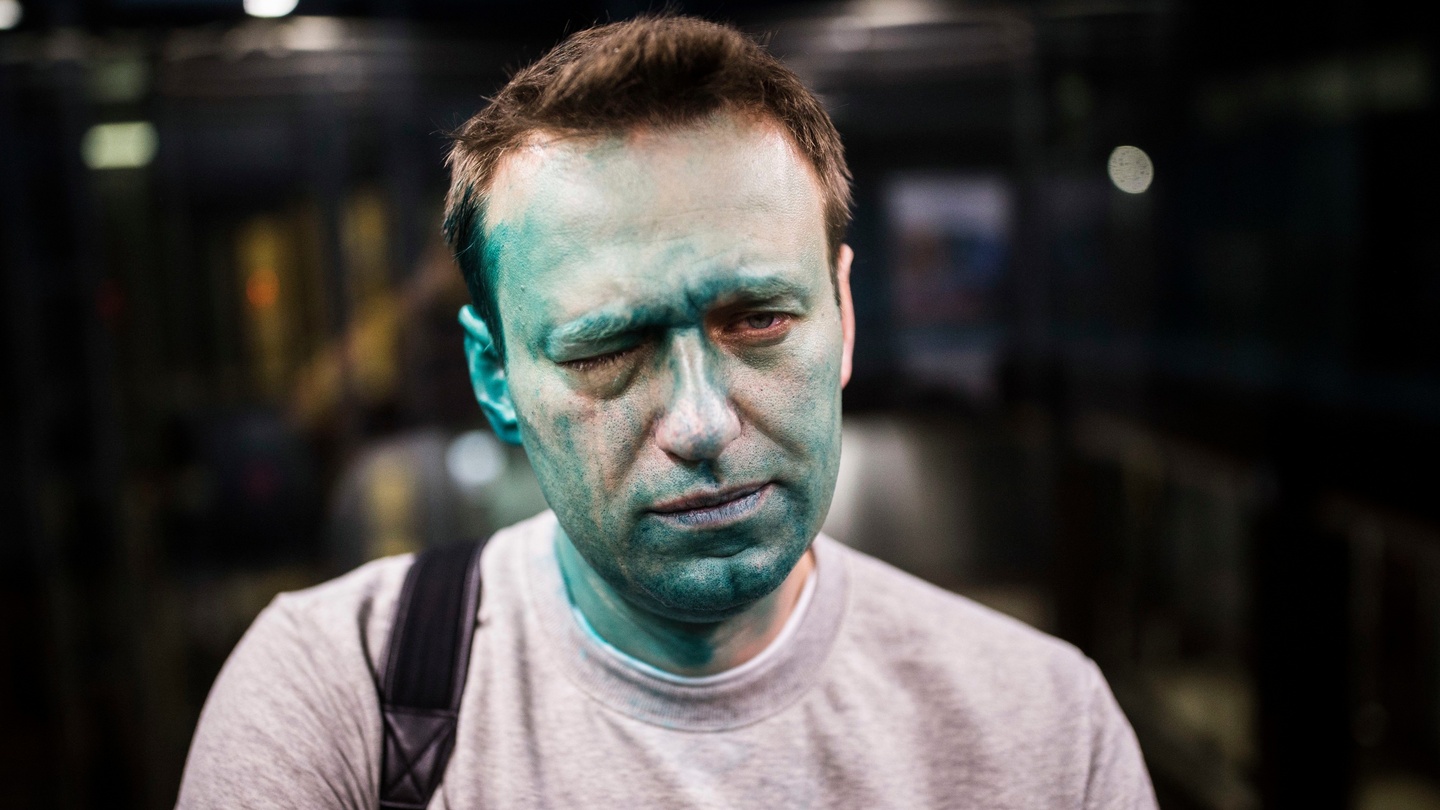
 Russian opposition leader Alexei Navalny after unknown attackers doused him with green antiseptic in Moscow. Evgeny Feldman/via AP
Russian opposition leader Alexei Navalny after unknown attackers doused him with green antiseptic in Moscow. Evgeny Feldman/via AP
Vladimir Putin is seen as godfather of the new populism—he's accused of helping anti-establishment figures like Donald Trump, Marine Le Pen in France, and the rising far-right politician Frauke Petry in Germany. Putin has admirers from Hungary's authoritarian Euroskeptic Viktor Orban to members of the so-called alt-right in the United States. But is Putin himself vulnerable to a populist challenge? Few groups are more “establishment” than Putin and his entourage—in power already 17 years.
Few figures in Russia have better harnessed popular frustrations with the venal corruption of the political class than anti-corruption crusader Alexei Navalny, whose presidential campaign bid has been repeatedly blocked by the Kremlin—and, yet, his campaign brought more than one hundred thousand people to the streets a few weeks ago. Navalny, like his populist counterparts in the West, dares to discuss what the establishment ignores.
On the one hand, Navalny is a liberal who advocates for better relations with the West, and a radical reduction in the vast state bureaucracy. These sorts of policies win him the support of the educated elite in Moscow and St. Petersburg. In 2013, he ran for mayor of Moscow and received 27% of the vote. Considering few expected Navalny to clear single-digit support, much less almost force a run-off between himself and the Kremlin supported candidate, Sergei Sobyanin, the result was impressive.
On the other hand, many of his policies indulge nationalist-populist tranches of society that, most worryingly for the Kremlin, expand his base of support. Unlike Putin, who has tip-toed around sensitive issues of immigration, Navalny calls for curtailing immigration from Central-Asian states by implementing a visa regime that shores up the border between Russia and those countries. Think: Trump's wall with Mexico.
Navalny is best known for his frequent and full-throated calls to crackdown on bureaucratic corruption. And unlike other anti-corruption activists, Navalny is not shy about painting Putin and high-level government officials as the main culprits of Russia's corrupt bureaucracy. After a multi-year recession, his anti-establishment rhetoric might be just what the average Russian wants. While Navalny isn't preaching to the choir—Putin's approval rating remains above 80%, and he has a captive audience—just 42% approve of the Russian government overall.
In fact, Navalny's anti-corruption crusade has already had a measurable effect. This March, after releasing a slick video detailing the corrupt enterprises of prime minister and former president Dmitry Medvedev, Navalny organized the largest anti-government protests in Russia since 2012. Embarrassed by the revelations, a few government officials felt forced to hesitantly request an investigation into his charges. The calls were rebuffed, but the tumult instantly caused Medvedev's approval rating to drop a marked 10%, and now more disapprove than approve of his performance.
In the past, the Kremlin has tried to brush off Navalny like an annoying gnat that if ignored long enough, might just go away. Unfortunately for them, he hasn't. Now, Navalny wants to run in Russia's presidential election next year, and, pushing through Kremlin-placed obstacles, Navalny might just be able to force Putin into an uncomfortable position—acknowledging that some oppose his rule.
A Russian court recently disqualified Navalny from running for president after finding him guilty of fraud in a thinly-veiled political trial. Never-to-be-deterred, Navalny contends that the statute disqualifying convicted felons from running is unconstitutional, and says he plans to run anyway. On the back of a successful anti-government campaign, Navalny is forcing the Kremlin to make a choice: let him run and risk losing its monopoly on political discourse, or don't let him run and risk amplifying the volume of protests, shattering the carefully-crafted illusion that Russia holds free elections.
The Kremlin takes this choice seriously. Sources inside the Kremlin say Putin's deputy chief of staff and domestic politics guru Sergei Kiriyenko reversed his position that Navalny doesn't constitute a threat. Kiriyenko now believes that the anti-corruption crusader could mar Putin's plan for a “beautiful victory” next year. Reports suggest the Kremlin wants 70% turnout, with 70% of those voting for Putin. By contrast, last year's parliamentary elections had just 48% turnout—the lowest in Russian history. If Navalny runs, Putin's victory might not be so smooth.
Vladimir Putin will undoubtedly win Russia's upcoming presidential election, whether Navalny runs or not. However, Navalny has become more a bee than a gnat; his sting can hurt. His success to date highlights important gaps in the Kremlin's political base, and hints that its control over Russian political discourse is not eternal. Western populists like Marine Le Pen or Donald Trump rally against the corrupt classes, urge social spending, and utilize xenophobia to their advantage. In each case, Putin scarcely hides his gleeful support for their causes. But just as Western citizens demand answers from entrenched leadership, so too can Russian citizens. If not careful, Putin could be hoisted on his own petard.